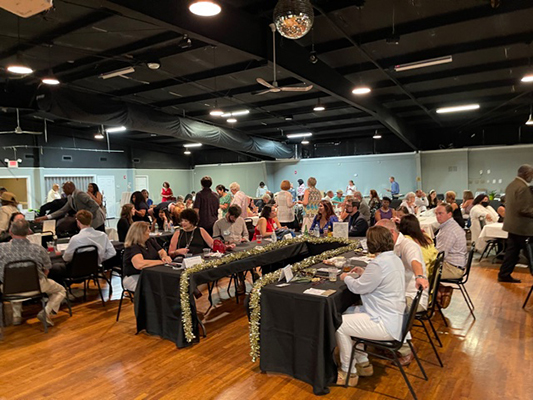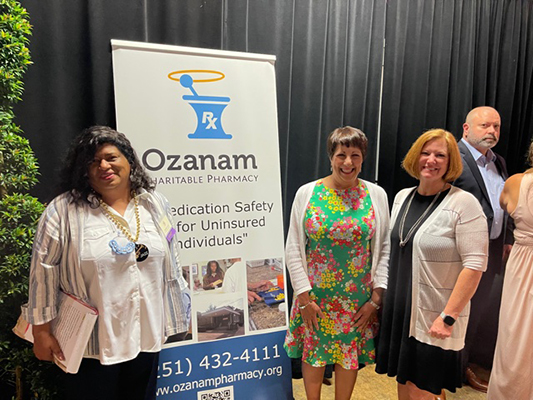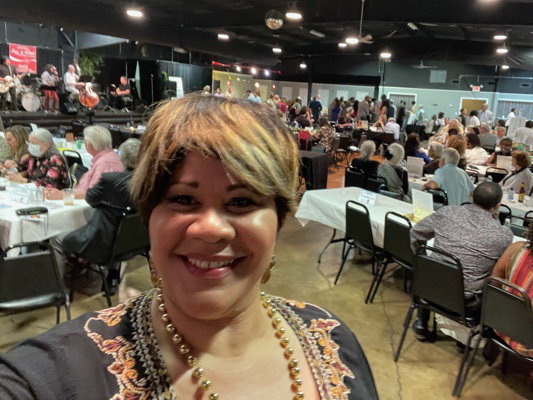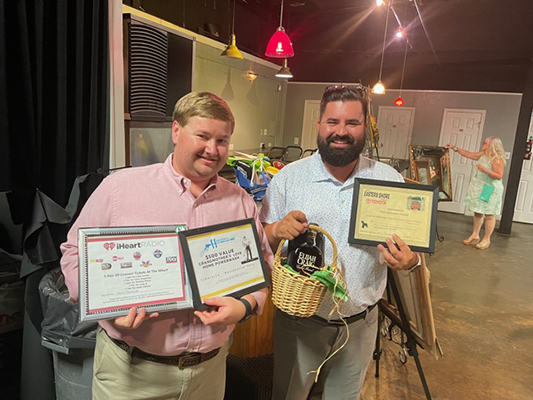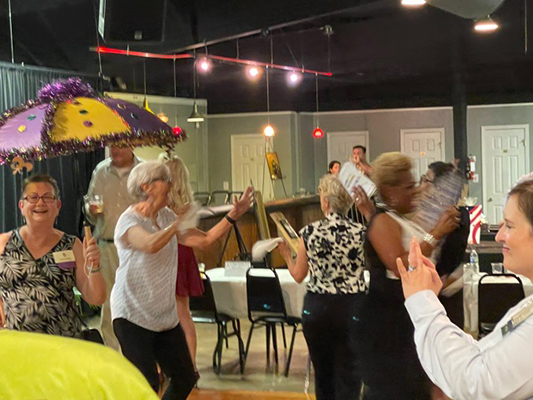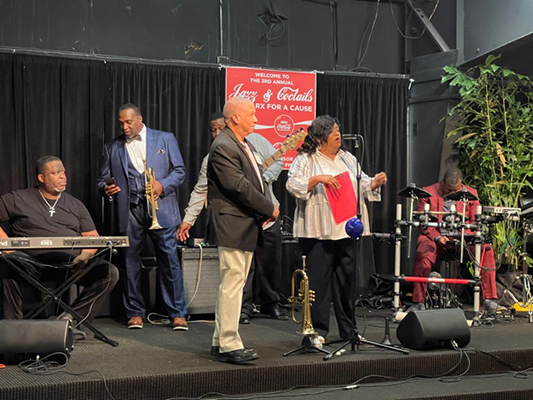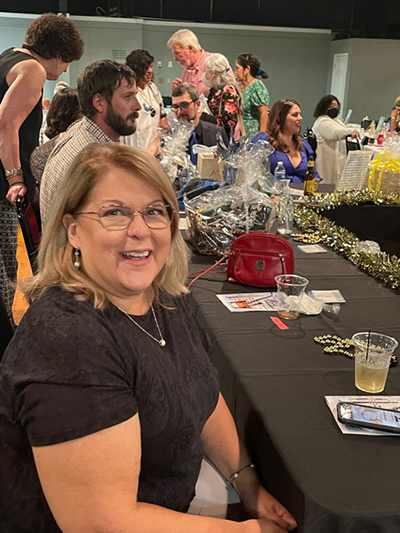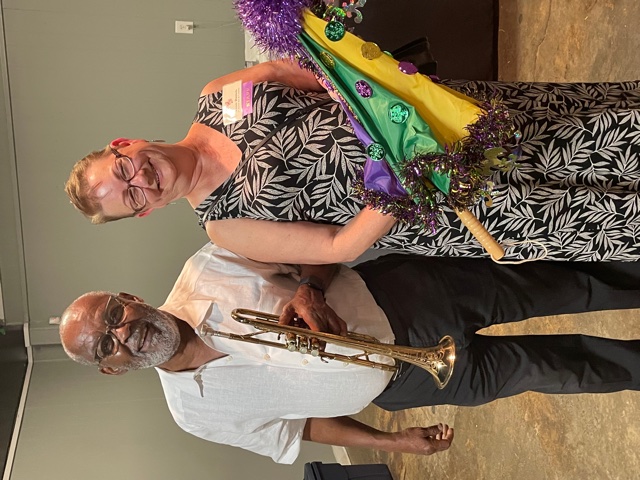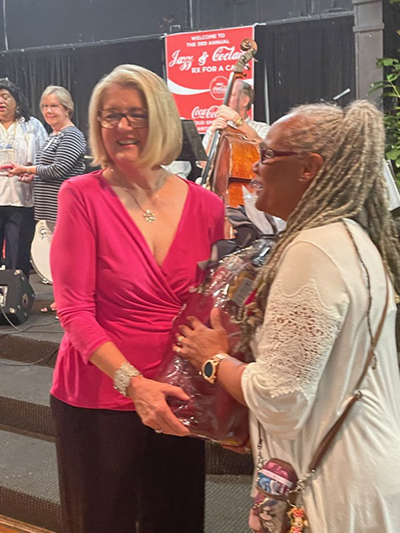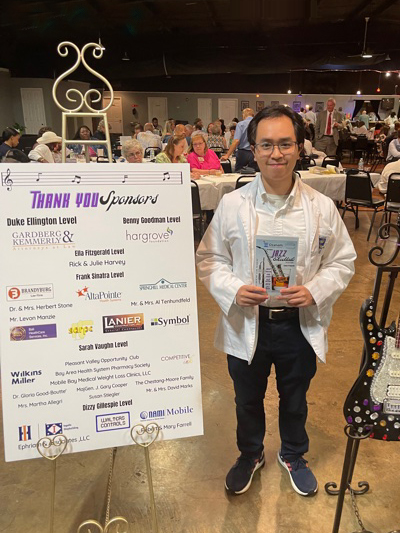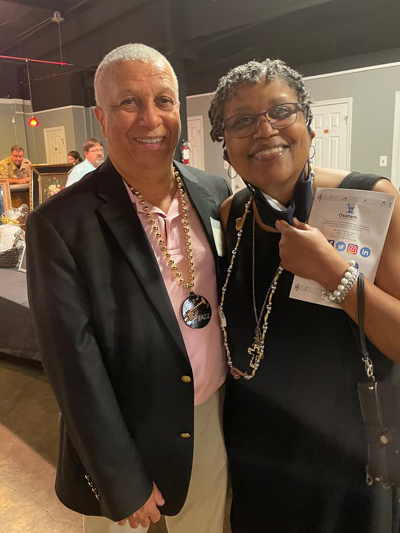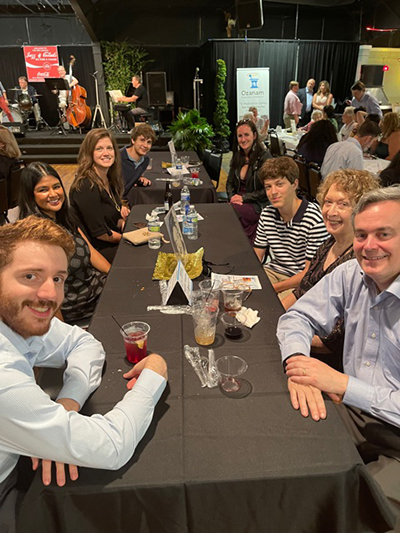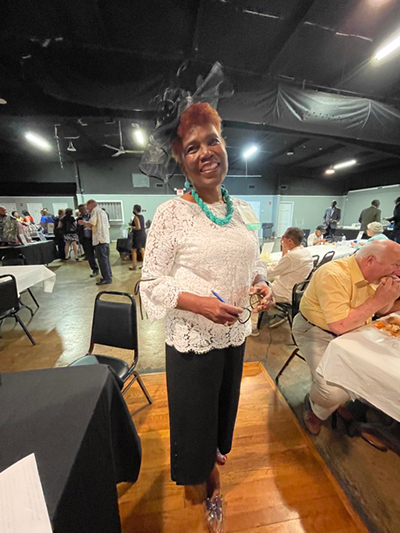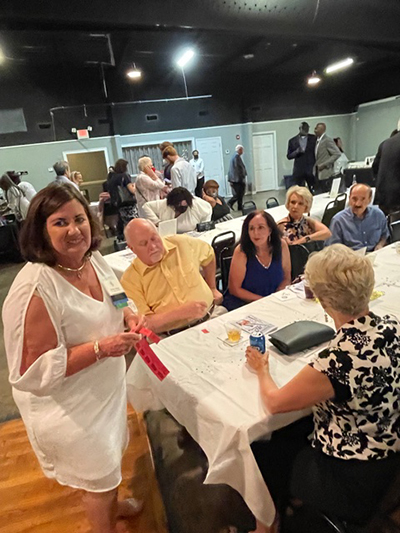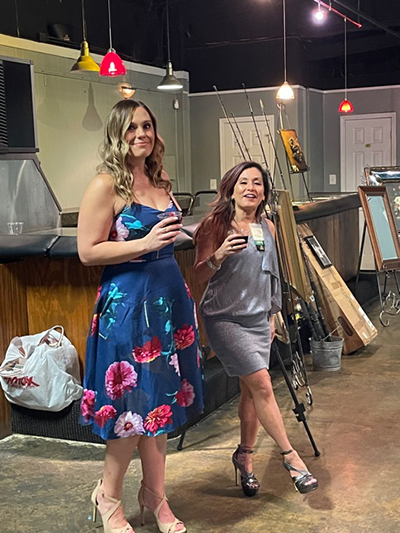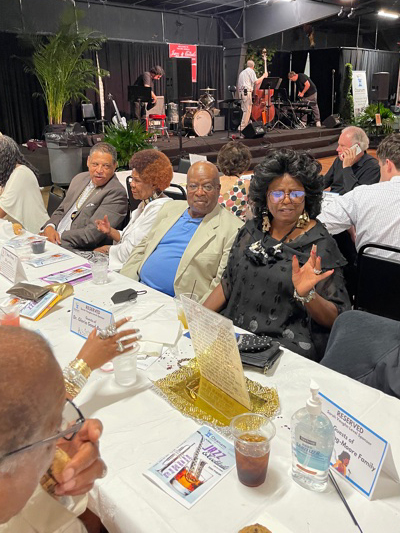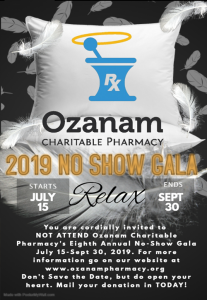Our 3rd Annual Jazz & Cocktails – A Rx For A Cause fundraiser was a great success! Thank you to our Sponsors who made this possible. Enjoy a few snapshots from the event below.
2021 Jazz and Cocktails

Jazz it up during Ozanam Charitable Pharmacy’s 3rd Annual Jazz & Cocktails, A Rx For A Cause fundraiser on Friday June 25th from 6 p.m. to 9 p.m. at the Grand Hall! Come swing-out to live jazz performed by “Alvin King & 5th K’nection” and “Swing” featuring vocalist Gabby Mertz, along with great “southern comfort cuisine” and spirits. An incredible silent auction features diamond jewelry, designer handbags and fragrances, luxury watches, entertainment experiences and more! We’ll even end the evening with a rousing “Second Line” lead by Mobile’s iconic Excelsior Band! Proceeds will benefit Ozanam Charitable Pharmacy, Alabama’s only free medication safety net for the uninsured in south Alabama.
Tickets cost $45 each | Purchase NOW!
View the 2021 Jazz & Cocktails Fundraiser Photos >
For more information call 251-432-4111.
2019 Jazz and Cocktails
 RX FOR A CAUSE” IS BACK!
RX FOR A CAUSE” IS BACK!
Time: 6:00 – 9:00 p.m.
Location: The Grand Hall
3556 Halls Mill Road, Mobile, AL
Featuring 3 great bands:
- Swing with vocalist, Gabby Merz
- Alvin King & 5th K’Nection
- The Excelsior Band, directed by Hosea London
- Plus craft cocktails, southern comfort food, a silent auction, raffle and a jazz trivia game
- Sponsorships available
- Lend a hand to the planning committee – Volunteer to help secure auction items, raffle prizes or distribute promotional materials throughout the community
Tickets: $45 each or Two for $80
PURCHASE ONLINE TICKETS SOON!!
- Silent Auction
- Raffle
- Jazz Trivia Game
All proceeds benefit Ozanam Charitable Pharmacy’s mission of providing free medicine to uninsured patients in Mobile, Baldwin, Escambia and Washington Counties.
OCP is a 501(c) 3. EIN#: 72-1386236
For more information please contact: 251-300-5907 or ychestang@ozanampharmacy.org.
COVID-19 – Volunteers Needed
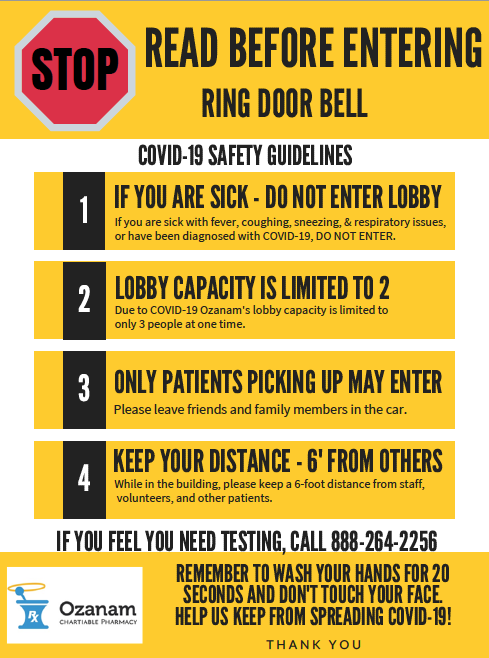 Volunteers from any of the health professions are needed to assist us with our main lobby service to check-in patients, and hand off their medications. Protective gear will be provided while on site. Ozanam continues to observe CDC guidelines for thoroughly disinfecting our lobby, service counters, offices, and restrooms, as well as regular hand washing and use of hand sanitizer, throughout each day.
Volunteers from any of the health professions are needed to assist us with our main lobby service to check-in patients, and hand off their medications. Protective gear will be provided while on site. Ozanam continues to observe CDC guidelines for thoroughly disinfecting our lobby, service counters, offices, and restrooms, as well as regular hand washing and use of hand sanitizer, throughout each day.
As the only, stand-alone licensed Charitable Pharmacy, Ozanam is the Medication Safety Net for 1704 uninsured patients residing in Mobile, Baldwin, Escambia Washington, and Mobile counties. Low income, working poor, and homeless patients rely on Ozanam Pharmacy to assist them with managing their chronic illnesses, such as heart disease and diabetes. Ozanam Pharmacy is closely monitoring updates from the Centers for Disease Control (CDC) concerning the Coronavirus Disease (COVID-19). We are also actively engaged with our national and state agencies, partners, and the local healthcare community to share updates and to coordinate efforts wherever possible, should the need arise.
At this time, Ozanam Charitable Pharmacy will continue to operate as usual. Our normal business hours of Monday through Thursday, from 9 am to 2:30 pm, remain in effect. We will continue to keep our patients, the media, and the healthcare community informed. For more information about Ozanam Charitable Pharmacy please contact us at (251) 432-4111, visit our website at www.ozanampharmacy.org and Like us on Facebook. You may also email Yvette Chestang, Ozanam’s Development and Marketing Coordinator, at ychestang@ozanampharmacy.org.
Wild Wild West Fundraiser
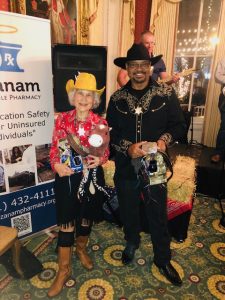 An amazing crowd of 200 cool cowboys and cowgirls gathered to eat, drink, and dance the night away on November 7th in support of Ozanam Charitable Pharmacy’s recent “Wild Wild West Fundraiser!” On a raining night, with a tornado having touched-down just blocks away from Ezell House, the party was in full swing. The incredible RuffWater Band filled the entire place with an eclectic variety of country, soft rock, jazz and R & B rhythms that pleased an enthusiastic crowd.. all decked out in their Wild West Best attire! The taco and chili bar with all of the trimmings was also a huge hit, as was the fun-filled photo booth. Raffle prize winners were thrilled with awesome gift baskets, the Apple iWatch and overnight stys at our best local hotels! We are excited for the opportunity to bring this exciting event back next year, with a few new surprises, so stay tuned!
An amazing crowd of 200 cool cowboys and cowgirls gathered to eat, drink, and dance the night away on November 7th in support of Ozanam Charitable Pharmacy’s recent “Wild Wild West Fundraiser!” On a raining night, with a tornado having touched-down just blocks away from Ezell House, the party was in full swing. The incredible RuffWater Band filled the entire place with an eclectic variety of country, soft rock, jazz and R & B rhythms that pleased an enthusiastic crowd.. all decked out in their Wild West Best attire! The taco and chili bar with all of the trimmings was also a huge hit, as was the fun-filled photo booth. Raffle prize winners were thrilled with awesome gift baskets, the Apple iWatch and overnight stys at our best local hotels! We are excited for the opportunity to bring this exciting event back next year, with a few new surprises, so stay tuned!
A wealth of gratitude is due to our incredible list of Wild Wild West Fundraiser sponsors and community partners:
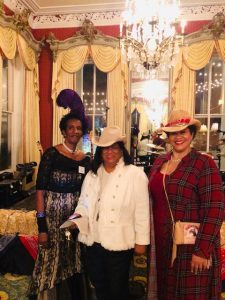
- Alta Pointe Health Systems
- Gardberg & Kemmerly Attorneys at Law
- SARPC
- Servis First Bank
- LaZboy Furniture Galleries
- Christine & Steven Cumbie
- Levon Manzie, President, Mobile City Council
- Linda & Al Tenhundfeld
- Brenda & Wiley Christian
- Mary & Herbert Stone
- Patricia & Charles Hyland
- Dr. S. Blaise Chromiak
- Merritte Accounting & Payroll Services, Inc.
- Sherry Coker
- Martha Allgri
- Susan Stiegler
- Ezell House
- Namans Catering
- Bottles Up Mobile
- The Original Oyster House – Spanish Fort
- Shoe Hospital Mobile
- Moonpie General Store
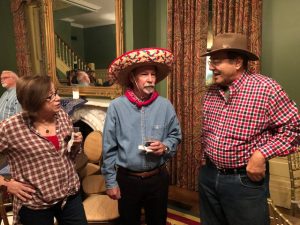

Ingalls Shipbuilding Annual Day of Caring
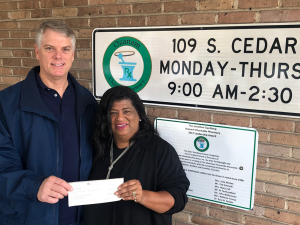 The Ozanam Charitable Pharmacy office and grounds were blessed with an abundance of “TLC” on October 19, 2019. The incredible management and staff of Ingalls Shipbuilding chose Ozanam as the focus of their “Annual Day of Caring” community service program. The program is an opportunity for Ingalls Shipbuilding employees to give back to the Mobile County community. Over the course of a day, Ingalls employees complete various maintenance projects. Here at Ozanam Charitable Pharmacy (OCP), the Ingalls Shipbuilding staff pruned the small trees and shrubs surrounding the exterior of the building. They also vacuumed and shampooed the office carpeting, cleaned the office furniture and counters. Thanks to such a caring group of cheerful volunteers, OCP is looking “ship-shape” these days! Furthermore, OCP received an additional blessing, as Ingalls Shipbuilding President, Brian J. Cuccias, stopped by to present a donation check for $5,000.00, to Executive Director, Shearie Archer, to express the company’s appreciation and support for the services provided by OCP. The program also received news coverage from WKRG News 5. The fellowship we established during the activity didn’t stop that day…weeks later a few of the Annual Day of Caring participants attended Ozanam’s Wild Wild West Fundraiser! OCP welcomes opportunities to develop community partnerships.
For information on how your organization may get involved in supporting OCP, please contact Shearie Archer at sarcher@ozzanampharmacy.org or call (251) 366-0713.
The Ozanam Charitable Pharmacy office and grounds were blessed with an abundance of “TLC” on October 19, 2019. The incredible management and staff of Ingalls Shipbuilding chose Ozanam as the focus of their “Annual Day of Caring” community service program. The program is an opportunity for Ingalls Shipbuilding employees to give back to the Mobile County community. Over the course of a day, Ingalls employees complete various maintenance projects. Here at Ozanam Charitable Pharmacy (OCP), the Ingalls Shipbuilding staff pruned the small trees and shrubs surrounding the exterior of the building. They also vacuumed and shampooed the office carpeting, cleaned the office furniture and counters. Thanks to such a caring group of cheerful volunteers, OCP is looking “ship-shape” these days! Furthermore, OCP received an additional blessing, as Ingalls Shipbuilding President, Brian J. Cuccias, stopped by to present a donation check for $5,000.00, to Executive Director, Shearie Archer, to express the company’s appreciation and support for the services provided by OCP. The program also received news coverage from WKRG News 5. The fellowship we established during the activity didn’t stop that day…weeks later a few of the Annual Day of Caring participants attended Ozanam’s Wild Wild West Fundraiser! OCP welcomes opportunities to develop community partnerships.
For information on how your organization may get involved in supporting OCP, please contact Shearie Archer at sarcher@ozzanampharmacy.org or call (251) 366-0713.
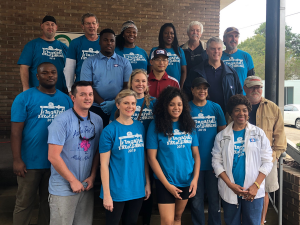
Ozanam Charitable Pharmacy Now Serving Washington County
Ozanam Charitable Pharmacy is now serving those in Washington County. For more information on becoming certified, contact Community Action via the following:
Washington County
Community Action
Ph. 251-829-5418
Ph. 251-847-2721

2019 No-Show Gala
Kazoola’s Eatery Hosts Father’s Day Crawfish Boil benefiting Ozanam Charitable Pharmacy
For Immediate Release
May 20, 2019
Kazoola’s Eatery Hosts Father’s Day Crawfish Boil benefiting Ozanam Charitable Pharmacy
Mobile, AL – Kazoola’s Eatery will host “Father’s Day Crawfish Boil Fundraiser benefiting Ozanam Charitable Pharmacy” on June 16, 2019 from 4:00 pm to 6:00 pm at Kazoola’s Eatery, located at 558 Dauphin St, Mobile, AL 36602. This year’s fundraiser, “Father’s Day Crawfish Boil” will benefit the mission of Ozanam Pharmacy to provide prescription assistance to those in our area with limited incomes and no insurance who are unable to afford necessary prescription medications.
Tickets for the event are $10 per person and $15 for couples. Tickets can be purchased online at www.ozanampharmacy.org, at the door of the event, or Ozanam Charitable Pharmacy. Ticket prices include all you can eat crawfish. Vendor table opportunities are available for $35.00. Donations are welcome. Email tcarroll@ozanampharmacy.org for information.
In 2018, Ozanam Charitable Pharmacy dispensed over 31,000 prescriptions to over 1690 individuals in their 4-county service area. These prescriptions had a retail value of $2.8 million. Ozanam serves qualified adults between the ages of 19-65 who have no insurance and are unable to afford life-sustaining prescription medications. These local residents are often working 2 or 3 jobs but still may have to make the choice between prescription medications or putting food on the table for their families. Ozanam is a community based free pharmacy and we need your help more than ever this year. Because of rising cost of insulin and other prescription needs.
Please join in the fun on Sunday, June 16, 2019 at Kazoola’s Eatery to help provide life-sustaining medications for those in need. All net proceeds go to Ozanam Charitable Pharmacy. For more information about Ozanam Charitable Pharmacy or the “Father’s Day Crawfish Boil benefiting Ozanam Charitable Pharmacy” event go to www.ozanampharmacy.org, like them on Facebook, follow them on Twitter or call 432-4111 or 251-721-0458
ServisFirst Banker Joins Board of Directors
Ms. Sherry Coker, a Private Banker with ServisFirst Bank, has joined the Board of Directors of Ozanam Charitable Pharmacy. Ms. Coker has been with ServisFirst since it opened in Mobile in 2013. She previously served as a Manager with Banktrust and is a Director of the Alabama Banking School. She serves as a corporate volunteer with the Mobile Area Chamber of Commerce and has served on the Board of Directors of the SOMI Club. 
Ozanam Charitable Pharmacy is a fully licensed pharmacy providing prescription medications to uninsured and underinsured individuals. Prescriptions are filled free of charge to individuals who qualify based on household income. In FY 2016/17, Ozanam dispensed over 28,000 prescriptions with a retail value of over $2 million to 1671 patients in Mobile, Baldwin and Escambia (AL) counties.
Ozanam Charitable Pharmacy, Inc. is funded in part by the Mobile County Commission, Baldwin County Commission, HUD, Catholic Charities, United Way of Southwest Alabama, the City of Mobile, the South Alabama Regional Planning Commission, foundations and individuals. The members of the Board of Directors volunteer their time to guide the operations of Ozanam Pharmacy to ensure community needs are met in the most cost effective way possible.

